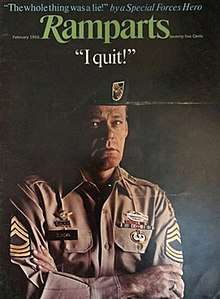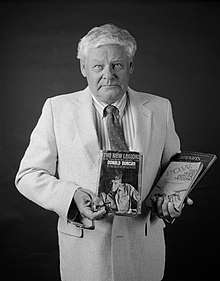Donald W. Duncan
Master Sergeant Donald Walter "Don" Duncan (March 18, 1930 – March 25, 2009) was a U.S. Army Special Forces soldier who served during the Vietnam War, helping to establish the guerrilla infiltration force Project DELTA there. Following his return to the United States, Duncan became one of the earliest military opponents of the war and one of the antiwar movement leading public figures. Duncan is best remembered as the cover image on the February 1966 issue of Ramparts where he announced "I quit", as well as for his testimony to the 1967 Russell Tribunal detailing American war crimes in Vietnam.[2]
Donald Duncan | |
|---|---|
 Ramparts Magazine February 1966: Duncan Says "I Quit" | |
| Born | Donald Walter Duncan March 25, 1930 |
| Died | March 25, 2009 (aged 79) Madison, Indiana |
| Occupation |
|
- This is about the American soldier and anti-war activist. For others, see Donald Duncan (disambiguation).
Biography
Early years
Donald Walter Duncan, known to his friends as "Don", was born to Walter Cameron Duncan and Norma Duncan (nee Brooker) in Toronto on March 18, 1930, but was a US citizen.[1] Duncan's father died when he was young, and his mother married Henry de Czanyi von Gerber, a naturalized American, cellist and orchestra conductor. Through the marriage Duncan gained a stepsister, Frances (later known as actress Mitzi Gaynor).[3]
Military career
Duncan was drafted into the U.S. Army in December 1956, serving as a non-commissioned officer in Germany in the field of operations and intelligence.[1]
Duncan transferred to U.S. Army Special Forces (the "Green Berets") in the first part of 1961, where he continued to work in the field of operations and intelligence.[1] During this interval Duncan received additional training in communications, weapons, and demolitions.[1] Duncan served as an instructor at the United States Army Special Warfare School at Fort Bragg, North Carolina for a year and a half, teaching courses to Special Forces members on intelligence tactics and interrogation methods.[4]
Duncan was deployed in Vietnam in March 1964, serving in a variety of capacities with the 5th Special Forces Group and Project DELTA, which he helped to organize.[1] In addition to briefing and debriefing incoming and outgoing soldiers in the theater, Duncan directly participated in 8-member intelligence and "hunter-killer" teams.[1]
As a result of his combat activity, Duncan was a recipient of two awards of the Bronze Star, the Air Medal, and the Vietnamese Cross of Gallantry with Silver Star.[1] He was additionally recommended for the Silver Star and the Legion of Merit as well as a field promotion to captain, all of which he refused over time.[1]
Duncan was also tapped to help write the official history of U.S. Special Forces in Vietnam, spending the last 6 or 8 weeks of his tour engaged in this task.[1] He later recalled, "I had to pour over MACV (Military Assistance Command, Vietnam) intelligence reports almost daily.... I was absolutely astounded. It was bullshit. Pure fabrication. Routine fabrication.... From that day I grabbed and analyzed every report I could get my hands on having anything to do with intelligence and policy. It was obvious we had no policy and intelligence was whatever MACV said it was." He continued, "Instead of cleaning up corruption in the country, we became the biggest contributors to it. We supported the worst elements in the country. We had nothing to win. The whole thing was a lie."[5]
Disillusioned with the military situation of the war, Duncan declined the offer of promotion and ended his military career, returning to America.
Journalistic career
Back home in the United States, Duncan moved to Berkeley, California with his wife.[1] There he became active in the anti-war movement and became a writer for Ramparts magazine, one of the leading publications of the New Left in America.
In the February 1966 issue of Ramparts, Duncan published a fierce critique of American participation in the war, entitled "The Whole Thing was a Lie!" The magazine cover famously showed Duncan in his full Master Sergeant uniform announcing "I quit". The article explained his opposition to the war by providing details on the American connection to the corrupt government of South Vietnam as well as atrocities in the American conduct of the war effort, including training in the use of torture in interrogations and the use of Vietnamese proxies for the summary execution of prisoners.
In 1967 Random House published a book written by Duncan entitled The New Legions which was sharply critical of the American military campaign in Vietnam.
Duncan also presented testimony on American war crimes in Vietnam to the Russell Tribunal in Roskilde, Denmark in November 1967, where he was one of the first three former American soldiers to testify.[6] There he detailed a de facto class in torture techniques conducted for members of the Special Forces entitled "Counter-Measures to Hostile Interrogation."[7]
In 1971 Duncan delivered the closing statement to the Winter Soldier Investigation conducted by Vietnam Veterans Against the War.
Later life

Duncan settled in Indiana around 1980 and in 1990 founded a nonprofit group that provided services for the poor. Duncan died in a nursing home in Madison, Indiana, on March 25, 2009.[8] His obituary appeared in The Madison Courier that month but it did not note his antiwar history. The New York Times ran an obituary in May 2016, after discovering while pursuing an advance obituary that Duncan had died seven years earlier. "If another news organization, particularly one with national reach, had run an obituary in 2009, we would have stood down, acknowledging that we had been napping back then and that it was way too late now to make up for the lapse," Times Obituary Editor William McDonald wrote.
A competitive daily newspaper isn't keen on reporting something that happened seven years ago. Unless, of course, virtually no one else had reported it. We decided to pursue the obituary, the seven years notwithstanding. The thinking was, we would have written about Mr. Duncan immediately after he died had we known, so we should apply the same standard now. His death, in a sense, was still news, and his story still deserved to be told. What's more, in an odd way, the very obscurity of his death added an unexpected, even poignant, element.
The Times obituary by Robert McFadden said Duncan
died in the obscurity of a small Midwestern town seven years ago, an all-but-forgotten soldier. He was 79. In an age of seeming information ubiquity, the news media will generally recall the lives of noteworthy people when they die. But Mr. Duncan's death went largely unnoticed outside of Madison, Ind., the Ohio River town where he lived.[8]
Works
Further reading
- John Duffett (ed.), Against the Crime of Silence: Proceedings of the Russell International War Crimes Tribunal. New York: O'Hare Books, 1968.
- Angus MacKenzie, Secrets: The CIA's War at Home. Berkeley, CA: University of California Press, 1999.
- Gerald Nicosia, Home to War: A History of Vietnam Veterans' Movement. New York: Crown Publishers, 2001.
See also
- A Matter of Conscience
- Concerned Officers Movement
- Court-martial of Howard Levy
- Fort Hood Three
- GI's Against Fascism
- GI Coffeehouses
- Movement for a Democratic Military
- Opposition to United States involvement in the Vietnam War
- Presidio mutiny
- Sir! No Sir!, a documentary about the anti-war movement within the ranks of the United States Armed Forces
- Stop Our Ship (SOS) anti-Vietnam War movement in and around the U.S. Navy
- Vietnam Veterans Against the War
- Waging Peace in Vietnam
- Winter Soldier Investigation
External links
- Donald Duncan Testimony and Questioning, Russell Commission, November 1967, www.Vietnamese-American.org/
- "Winter Soldier Investigation testimony," Vietnam Veterans Against the War, Jan. 31 to Feb. 2, 1971. www2.iath.virginia.edu/
- Donald Duncan oral history from A Matter of Conscience - GI Resistance During the Vietnam War
- Sir! No Sir!, a film about GI resistance to the Vietnam War
- Waging Peace in Vietnam - US Soldiers and Veterans Who Opposed the War
- A Matter of Conscience - GI Resistance During the Vietnam War
Footnotes
- "Donald Duncan," Project Delta, www.projectdelta.net/
- Carver, Ron; Cortright, David; Doherty, Barbara, eds. (2019). Waging Peace in Vietnam: U.S. Soldiers and Veterans Who Opposed the War. Oakland, CA: New Village Press. pp. 8–10. ISBN 9781613321072.
- McFadden, Robert (2016-05-06). "Donald W. Duncan, 79, Ex-Green Beret and Early Critic of Vietnam War, Is Dead". The New York Times. Retrieved 7 December 2017.
- Donald Duncan, Testimony to the Russell Commission Archived July 17, 2012, at the Wayback Machine, November 1967, p. 272.
- Seidenberg, Willa; Short, William (1992-10-01). A Matter of Conscience: GI Resistance During the Vietnam War. Andover, MA: Addison Gallery of American Art. p. 38. ISBN 1879886324.
- Tod Ensign, "Organizing Veterans Through War Crimes Documentation," Citizen Soldier, www2.iath.virginia.edu/
- Anthony A. D' Amato, with Harvey L. Gould and Larry D. Woods, "War Crimes and Vietnam: The 'Nuremberg Defense' and the Military Service Resister," Archived 2012-08-25 at the Wayback Machine California Law Review, vol. 57, 1055 (1969) Code A69d; fn. 43, pp. 31–32.
- Donald W. Duncan, 79, Ex-Green Beret and Early Critic of Vietnam War, Is Dead; New York Times; Robert D. McFadden; May 6, 2016